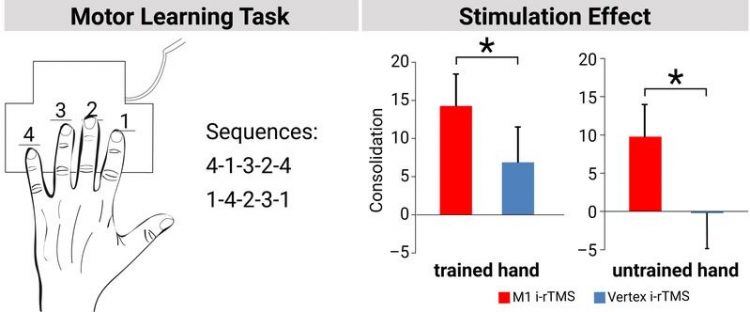Take a break! Brain stimulation improves motor learning

If the scientists stimulated the brain in the breaks between the short exercise sequences, the trained sequence could be better recalled by participants. MPI CBS/Jost-Julian Rumpf
When exactly does the brain “remember” a newly learned motor sequence? Previously, it was assumed that the stabilization of learned motor processes does not begin until the exercise is complete and then runs for several hours.
However, recent work shows that already short breaks within practice sessions shape later recall. “We wanted to understand how relevant the so-called consolidation or perpetuation in these short pauses during practice is for later recall, after several hours, and whether we can influence these processes with brain stimulation,” said first author Jost-Julian Rumpf.
The neurologist developed the study with healthy participants together with MPI researcher Gesa Hartwigsen. Participants had to type a simple sequence of numbers on a keyboard as quickly and accurately as possible. During practice, short pauses were taken after a certain number of trials and participants received magnetic stimulation of the brain during these breaks. The scientists wondered what was going on in the brain during the pauses – could it be that it was already learning at this point?
“The idea was to use magnetic stimulation to specifically influence the motor cortex during the short breaks between individual exercise units,” reports Gesa Hartwigsen. It turned out that the brain stimulation during the short breaks improved recall of the learned number sequence when participants were tested six hours later. Although the participants had stopped practicing, the brain processed the practiced sequences more effectively if the brain had been stimulated during the short pauses within the training, presumably creating a stronger mental trace.
The researchers were also able to observe a so-called “transfer effect”, from the trained hand to the other hand. “If we stimulated the brain in the breaks between the short exercise sequences, the trained sequence could be better recalled, not only with the trained hand, but also with the other hand,” says the scientist.
Next, the researchers want to investigate the effects of their stimulation approach in older people who, in comparison with younger people, often have limitations in consolidation after motor learning and could, in the long term, benefit greatly from stimulation.
PD Dr. Gesa Hartwigsen
Research group leader MPI CBS
Phone: +49 341 9940-162
Email: hartwigsen@cbs.mpg.de
Dr. med. Jost-Julian Rumpf
Senior physician
Email: jost-julian.rumpf@medizin.uni-leipzig.de
Leipzig University, Department of Neurology
“Interleaving motor sequence training with high-frequency rTMS facilitates consolidation” in Cerebral Cortex: https://tinyurl.com/y3t3twqv
Media Contact
All latest news from the category: Health and Medicine
This subject area encompasses research and studies in the field of human medicine.
Among the wide-ranging list of topics covered here are anesthesiology, anatomy, surgery, human genetics, hygiene and environmental medicine, internal medicine, neurology, pharmacology, physiology, urology and dental medicine.
Newest articles

NASA: Mystery of life’s handedness deepens
The mystery of why life uses molecules with specific orientations has deepened with a NASA-funded discovery that RNA — a key molecule thought to have potentially held the instructions for…

What are the effects of historic lithium mining on water quality?
Study reveals low levels of common contaminants but high levels of other elements in waters associated with an abandoned lithium mine. Lithium ore and mining waste from a historic lithium…

Quantum-inspired design boosts efficiency of heat-to-electricity conversion
Rice engineers take unconventional route to improving thermophotovoltaic systems. Researchers at Rice University have found a new way to improve a key element of thermophotovoltaic (TPV) systems, which convert heat…



